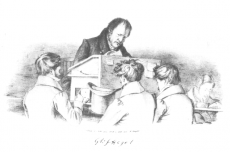
Email: ZYVC057@live.rhul.ac.uk
Total Article : 213
About Me:I'm a graduate student studying International Criminal Law and first started writing for King's News almost 4 years ago! My hobbies include reading, travelling and charity work. I cover many categories but my favourite articles to write are about mysteries of the ancient world, interesting places to visit, the Italian language and animals!

In regards to political theory - like Kant - Hegel believes humans are rational as they have an end not just a means and as such their rights must be recognized by the state. The state must be ruled by law, not merely by caprice, and all must be equal under law. He breaks from Kant when assuming that the political society should indeed realise and express this idea.
As for the state, Charles Taylor noted that for Hegel ‘the state is the collective mode of life which is backed by the full power of the community.. Freedom must be embodied in the state’. Hegel is interested in humans, in particular relationships with family, love, and particularly the state. Through connection and belonging to the state we are able to realise ourselves. The state is the embodiment of universal life and it has the improtant task of keeping internal elements in balance. The state can enable self-fulfilment; Hegel’s view on the state may be idealistic but he does not recognise all states as good. When a state fails to represent society it becomes alienated (a term used plenty by Karl Marx) resulting in individualism as we turn to ourselves and fail to live our full lives.
In the realm of international relations there cannot be a universal right, we do not have contradictions beyond the state as it is the limit if ethical rights. Like Hobbes, Hegel believes the state is self-contained. Not only does the state realise itself in internal meanings but it also struggles when facing other states.
A ‘state shall not meddle with the internal affairs of another state. Yet, on the other side, it is essential for its completeness that it be recognised by others. But this recognition demands as a guarantee that it shall recognise those who recognise it, and will have respect for their independence.’ We also need a sense of other states in order to be fully realised through inter-subjectivity. Hegel is often described as a war monger as he argues that was is necessary for the construction of the state. War can bind people to the state, sacrificing oneself for the state is therefore somewhat justified as a protection of one’s ethical values. In fact, ‘The state is an individual, and negation is an essential component of individuality... Not only do peoples emerge from wars with added strength, but nations troubled by civil dissension gain internal peace as a result of wars with their external enemies.’
Image: http://www.hegel-gesellschaft.de/sites/startgrafiken/hegelzitiert.gif

0 Comment:
Be the first one to comment on this article.